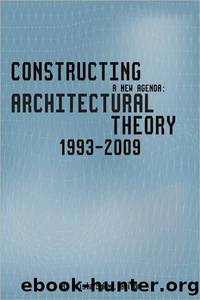Constructing a New Agenda: Architectural Theory 1993-2009 by A. Krista Sykes & K. Michael Hays

Author:A. Krista Sykes & K. Michael Hays [Sykes, A. Krista & Hays, K. Michael]
Language: eng
Format: epub
Tags: criticism, a krista sykes, theory, reference, design, architecture
ISBN: 9781568988597
Publisher: Princeton University
Published: 2010-03-29T22:00:00+00:00
INTRODUCTION
Architecture and the Virtual: Towards a New Materiality / Antoine Picon
Trained as an architect, engineer, and historian, Antoine Picon has focused his work primarily on the intersection of architecture and technology. In his article “Architecture and the Virtual: Towards a New Materiality,” Picon addresses the potential impact of the computer and computer-aided design on materiality. While some view the computer as a threat to architectural materiality, an overtaking of the actual by the virtual, Picon—a professor of architectural history and technology at Harvard Graduate School of Design—proposes that the computer creates a new understanding and experience of materiality.
Picon begins his discussion with an examination of architectural representation, asserting that it is both ambiguous and abstract by nature; the plan, for example, is actually quite abstract in that we never experience a building as seen in plan. (In fact, is not the experience of a computer-generated fly-through more “real” than that of a two-dimensional plan?) Thoughts such as this lead Picon to ask, “Do computer representations imply a clear departure from the traditional practice of architecture?” His answer is both yes and no: digitization is, in part, a tool employed by the architect, in some ways like any other tool, just more technologically advanced; at the same time, the use of the computer as a design tool introduces additional layers of mediation that do not exist with pencil and paper.
Here Picon raises the analogy of the automobile, a machine that has had tremendous ramifications for our perceptions of space, travel, and the environment. “Rather than dematerializing the world we inhabit, the automobile has instead transformed our notion of it,” allowing the experience of new sensations, scales, and forms, not to mention the development of now-everyday objects such as freeways, billboards, and parking lots. Thus, our previous understanding of materiality has been altered, but not through the dissolution of materiality itself.
A similar shift may result from the computer’s ever-growing involvement in architecture. In Picon’s view, recent explorations in digitized design have focused on surface and texture rather than volume, introduced unanticipated issues of scale, and rendered tectonics an increasingly complex facet of architectural representation. Flows of information, concrete data gleaned from any number of operations, often appear as influential components of architectural design, which is itself more abstract. This interaction of concrete and abstract, real and digital, suggests a new hybrid of materiality, according to Picon, that goes hand in hand with a possible new conception of what it means to practice architecture.
The computer and digitization have recast our traditional understanding of materiality, of the process of design, and of architecture as a whole, and this recasting will continue as technology matures. Picon forecasts a generalization in design on the horizon, as digital technologies allow architects to become more involved in the creation of building materials and the surrounding environment; he hopes that the expansion and hence reevaluation of the architectural discipline will lead to a increased sense of moral responsibility, guiding us toward a future in which architecture plays a greater social and political role.
Download
This site does not store any files on its server. We only index and link to content provided by other sites. Please contact the content providers to delete copyright contents if any and email us, we'll remove relevant links or contents immediately.
Kathy Andrews Collection by Kathy Andrews(10509)
The remains of the day by Kazuo Ishiguro(7543)
Spare by Prince Harry The Duke of Sussex(4188)
Paper Towns by Green John(4165)
The Body: A Guide for Occupants by Bill Bryson(3791)
Be in a Treehouse by Pete Nelson(3206)
Harry Potter and the Goblet Of Fire by J.K. Rowling(3025)
Goodbye Paradise(2950)
Never by Ken Follett(2873)
Into Thin Air by Jon Krakauer(2695)
The Remains of the Day by Kazuo Ishiguro(2614)
The Genius of Japanese Carpentry by Azby Brown(2602)
The Cellar by Natasha Preston(2592)
Drawing Shortcuts: Developing Quick Drawing Skills Using Today's Technology by Leggitt Jim(2529)
120 Days of Sodom by Marquis de Sade(2428)
Architecture 101 by Nicole Bridge(2348)
The Man Who Died Twice by Richard Osman(2290)
Machine Learning at Scale with H2O by Gregory Keys | David Whiting(2267)
Fairy Tale by Stephen King(2058)
